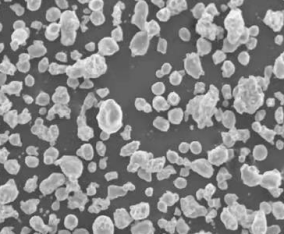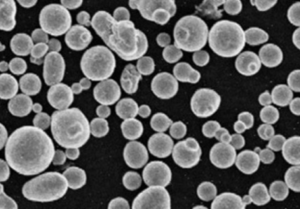Lorsqu'il s'agit d'applications à hautes performances telles que l'aérospatiale, les turbines à gaz et d'autres conditions extrêmes, les matériaux présentant une durabilité, une résistance à la chaleur et une solidité globale supérieures sont indispensables. La poudre CMSX-4 est l'un de ces matériaux qui se distingue dans ces domaines exigeants. Cet article présente tout ce qu'il faut savoir sur la poudre CMSX-4. Poudre CMSX-4Qu'est-ce que c'est, ses propriétés uniques, ses applications, sa comparaison avec d'autres poudres métalliques, et bien d'autres choses encore. Explorons le monde fascinant du CMSX-4 et de ses pairs !
Aperçu de la poudre CMSX-4
Le CMSX-4 est une poudre de superalliage monocristallin à base de nickel qui est largement utilisée dans les environnements à haute température et à forte contrainte, tels que ceux que l'on trouve dans les moteurs à réaction et les turbines à gaz. Il présente des propriétés mécaniques exceptionnelles, notamment une excellente résistance à l'oxydation et à la corrosion à des températures élevées. Sa composition unique garantit une résistance élevée au fluage, ce qui en fait un matériau clé dans la fabrication des aubes de turbines et d'autres composants critiques.
Dans cet article, nous vous présentons tout ce que vous devez savoir sur la poudre CMSX-4, sa composition, ses avantages et sa comparaison avec d'autres poudres métalliques de sa catégorie.
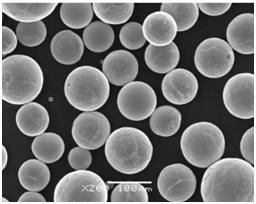
Composition de la poudre CMSX-4
La résistance du CMSX-4 provient de la composition unique de son alliage, qui combine des éléments tels que le nickel, le cobalt, le chrome, le tungstène et le tantale. Chacun de ces éléments contribue à ses performances supérieures dans des conditions extrêmes. Vous trouverez ci-dessous une description détaillée de la composition du CMSX-4 :
| Élément | Pourcentage (%) | Rôle |
|---|---|---|
| Nickel (Ni) | ~60 | Élément de base, assure la solidité et la résistance à la chaleur. |
| Cobalt (Co) | 9.6 | Améliore la résistance à la corrosion et la résistance mécanique. |
| Chrome (Cr) | 6.5 | Améliore la résistance à l'oxydation. |
| Tungstène (W) | 6.0 | Offre une résistance à haute température et une résistance au fluage. |
| Rhénium (Re) | 3.0 | Améliore la résistance au fluage et les performances en matière de température. |
| Tantale (Ta) | 6.5 | Améliore la résistance à l'oxydation et le renforcement des solutions solides. |
| Aluminium (Al) | 5.6 | Forme des couches d'oxyde stables pour la protection contre la corrosion. |
| Molybdène (Mo) | 0.6 | Contribue à la résistance au fluage et à la fatigue thermique. |
La composition du CMSX-4 est méticuleusement équilibrée pour garantir ses performances exceptionnelles dans les environnements à haute température. L'inclusion d'éléments tels que le rhénium et le tantale le distingue des autres alliages, car ils contribuent à maintenir l'intégrité du matériau même en cas de contraintes thermiques extrêmes.
Caractéristiques des CMSX-4 Poudre
Qu'est-ce qui rend le CMSX-4 si spécial ? Jetons un coup d'œil sur les caractéristiques qui le définissent.
1. Résistance élevée au fluage
Le CMSX-4 est réputé pour sa résistance supérieure au fluage, ce qui signifie qu'il peut supporter des contraintes constantes à des températures élevées pendant de longues périodes sans se déformer. Cette propriété le rend idéal pour des applications telles que les pales de turbines, où les matériaux doivent supporter simultanément une chaleur et des contraintes extrêmes.
2. Excellente résistance à l'oxydation et à la corrosion
Avec des éléments comme le chrome et l'aluminium dans sa composition, le CMSX-4 forme des couches d'oxyde protectrices qui empêchent l'oxydation et la corrosion, même lorsqu'elles sont exposées à des environnements difficiles.
3. Résistance supérieure à la fatigue thermique
Dans les applications où les températures fluctuent fortement, les matériaux risquent de se fissurer en raison de la fatigue thermique. Le CMSX-4 est très résistant à ces fluctuations, conservant son intégrité et empêchant la formation de fissures.
4. Structure monocristalline
La structure monocristalline du CMSX-4 signifie qu'il n'y a pas de joints de grains, qui sont des points faibles dans les alliages conventionnels. Sans ces points faibles, le matériau peut supporter plus de contraintes et mieux fonctionner dans des environnements à haute température.
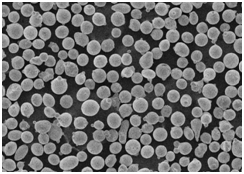

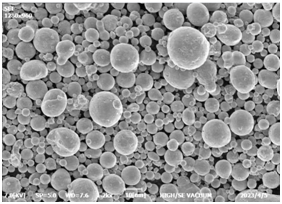

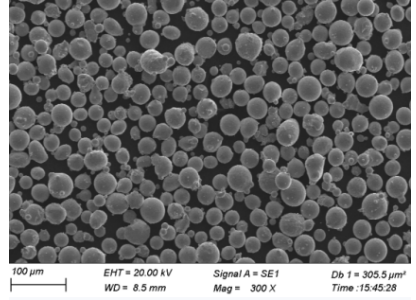
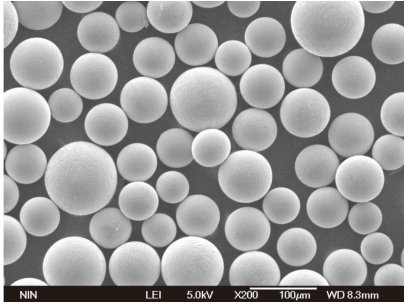
Avantages de la poudre CMSX-4
1. Performance à haute température
Le CMSX-4 résiste parfaitement aux températures extrêmes, ce qui en fait le matériau de prédilection pour les aubes de turbines et autres composants fonctionnant dans des environnements à haute température. Par rapport aux alliages traditionnels, il peut supporter des températures beaucoup plus élevées sans sacrifier les performances.
2. Résistance mécanique supérieure
Grâce à sa structure monocristalline et à sa composition soigneusement étudiée, le CMSX-4 présente une résistance mécanique exceptionnelle. Il peut maintenir son intégrité structurelle même sous une contrainte constante, ce qui est essentiel pour les applications à haute performance telles que les moteurs à réaction.
3. Excellente résistance à la corrosion et à l'oxydation
Dans les environnements où la corrosion et l'oxydation sont courantes, comme les turbines à gaz, la résistance du CMSX-4 à ces éléments garantit une plus longue durée de vie des composants. Il peut résister à l'exposition à des substances corrosives comme le kérosène sans se détériorer.
4. Longue durée de vie
Comparé à d'autres alliages, le CMSX-4 offre une durée de vie plus longue, ce qui réduit le besoin de remplacements fréquents. Il s'agit donc non seulement d'un matériau très performant, mais aussi d'un matériau rentable au fil du temps.
5. Personnalisation
Le CMSX-4 peut être transformé sous différentes formes, y compris en poudre, ce qui le rend polyvalent pour différents processus de fabrication tels que la fabrication additive (impression 3D) ou les méthodes de moulage traditionnelles.
Modèles de poudres métalliques spécifiques comparables au CMSX-4
Le CMSX-4 n'est pas la seule poudre métallique haute performance sur le marché. Plusieurs autres poudres métalliques offrent des propriétés uniques adaptées à des applications spécifiques. Voici une liste de dix poudres métalliques spécifiques comparées au CMSX-4 :
| Modèle | Composition | Caractéristiques principales |
|---|---|---|
| INCONEL 718 | Ni, Fe, Cr, Mo | Excellent pour les environnements cryogéniques, bonne résistance à la traction à haute température. |
| HAYNES 282 | Ni, Co, Cr, Mo | Offre un bon équilibre entre la résistance mécanique et la résistance au fluage à haute température. |
| MAR-M247 | Ni, Al, Ti | Moulabilité supérieure, haute résistance au fluage, souvent utilisé dans les aubes de turbines. |
| René 41 | Ni, Cr, Co | Haute résistance dans la plage 1400-1600°F, idéale pour les applications aérospatiales. |
| Nimonic 90 | Ni, Co, Cr | Excellente résistance à la corrosion et à l'oxydation, adaptée aux turbines à gaz. |
| Hastelloy X | Ni, Mo, Cr | Excellente résistance à l'oxydation jusqu'à 2200°F, bonne soudabilité. |
| Cobalt L-605 | Co, Cr, W | Très résistant à l'oxydation et à l'entartrage, fréquemment utilisé dans les composants de turbines. |
| CMSX-10 | Ni, Co, W, Re | Meilleure résistance au fluage et à la fatigue thermique par rapport au CMSX-4. |
| Udimet 500 | Ni, Cr, Co | Bonne résistance à l'oxydation et à la corrosion à chaud, souvent utilisé dans les moteurs à combustion. |
| Waspaloy | Ni, Cr, Co | Excellente stabilité à haute température, idéale pour les turbines à gaz et l'aérospatiale. |
Chacune de ces poudres métalliques offre des avantages uniques, mais le CMSX-4 reste un choix de premier ordre pour l'équilibre de ses propriétés et de ses performances dans les environnements extrêmes. Par exemple, par rapport au INCONEL 718Le CMSX-4 offre des performances supérieures à des températures plus élevées, mais l'INCONEL 718 peut être préféré dans des conditions cryogéniques. De même, HAYNES 282 offre un excellent équilibre entre résistance mécanique et résistance au fluage, mais le CMSX-4 le surpasse en termes de résistance à l'oxydation à haute température.
Applications de la poudre CMSX-4
Les propriétés uniques de la poudre CMSX-4 la rendent particulièrement adaptée à de nombreuses applications industrielles. Explorons ses utilisations dans divers domaines :
| application | Détails |
|---|---|
| Aérospatiale | Utilisé dans les aubes de turbines, les moteurs à réaction et d'autres composants à haute température. |
| Turbines à gaz | Essentiel pour les turbines à gaz industrielles, il offre une résistance à l'oxydation et à la chaleur. |
| Production d'électricité | Utilisé dans les composants qui doivent résister à une chaleur et à un stress extrêmes pendant de longues périodes. |
| Automobile | Les moteurs de course et les turbocompresseurs haute performance bénéficient de la résistance à la chaleur du CMSX-4. |
| Impression 3D | Grâce aux progrès de la fabrication additive, le CMSX-4 est utilisé dans les pièces de turbines imprimées en 3D. |
| Défense | Les systèmes de propulsion à réaction et les composants de missiles font appel au CMSX-4 pour sa durabilité et sa tolérance à la chaleur. |
La poudre CMSX-4 trouve ses applications les plus critiques dans les industries qui exigent fiabilité et durabilité dans des conditions extrêmes. Par rapport à d'autres poudres métalliques, elle est plus susceptible d'être utilisée dans des pièces de précision haut de gamme où la défaillance n'est pas envisageable, comme dans les moteurs d'avion.
Spécifications, tailles, qualités et normes
Lorsqu'il s'agit d'utiliser Poudre CMSX-4Pour garantir des performances optimales, les fabricants doivent respecter des normes et des spécifications spécifiques. Voici un aperçu des tailles, des qualités et des normes typiques pour le CMSX-4 :
| Spécifications | Détail |
|---|---|
| Taille des particules | 15-53 μm pour les applications de fabrication additive. |
| Forme | Poudre et moulage. |
| Normes | ASTM F3055-14a (fabrication additive), AMS 4138D (aérospatiale). |
| Notes | Qualité monocristalline, superalliage de deuxième génération. |
Il est essentiel de sélectionner la bonne taille de particules et de respecter les normes appropriées pour garantir que le produit final répond aux propriétés mécaniques et aux normes de performance requises.
Fournisseurs et détails des prix
Différents fournisseurs proposent la poudre CMSX-4 et les prix peuvent varier en fonction de la forme, de la quantité et des exigences spécifiques. Voici quelques fournisseurs courants et quelques considérations sur les prix :
| Fournisseur | Détails | Prix (approx.) |
|---|---|---|
| Praxair Surface Technologies | Propose le CMSX-4 sous forme de poudre pour la fabrication additive. | $400 - $500 par kg. |
| ATI Matériaux de spécialité | Fournit des composants CMSX-4 moulés. | Tarification personnalisée en fonction du projet. |
| Technologie des charpentiers | Fournit de la poudre et des lingots de CMSX-4 pour les pales de turbines. | $350 - $450 par kg. |
Le prix de la poudre CMSX-4 varie généralement entre $350 et $500 par kilogramme, mais les coûts peuvent varier en fonction du fournisseur et des exigences spécifiques du projet. Pour les projets sur mesure, les prix peuvent fluctuer en raison d'un traitement supplémentaire ou de spécifications particulières.
Avantages et inconvénients de la poudre CMSX-4 par rapport à d'autres poudres métalliques
Lorsqu'on choisit un matériau pour des applications à hautes performances, il est essentiel de peser le pour et le contre. Voici comment le CMSX-4 se positionne par rapport aux autres poudres du marché :
| Fonctionnalité | CMSX-4 | INCONEL 718 | HAYNES 282 |
|---|---|---|---|
| Résistance aux températures élevées | Excellent, jusqu'à 1200°C. | Bon, jusqu'à 700°C. | Très bon, jusqu'à 800°C. |
| Résistance au fluage | Remarquable à des températures élevées. | Modéré. | Haut. |
| Résistance à l'oxydation | Supérieure, avec d'excellentes performances. | Modéré. | Haute résistance à l'oxydation. |
| Coût | Plus élevé que l'INCONEL 718. | Coût modéré. | Comparable à CMSX-4. |
| Applications | Meilleur pour l'aérospatiale et les turbines. | Convient à une utilisation cryogénique. | Bon pour les turbines à gaz. |
Par rapport à INCONEL 718Le CMSX-4 offre des performances supérieures à haute température, mais son coût est plus élevé. HAYNES 282 offre un bon équilibre entre la résistance mécanique et la résistance au fluage, mais n'atteint pas tout à fait les capacités du CMSX-4 dans les environnements à très haute température.
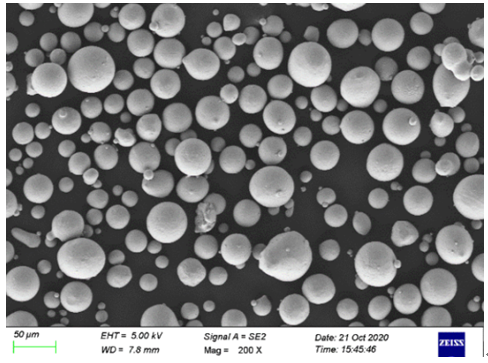
FAQ
| Question | Réponse |
|---|---|
| A quoi sert la poudre CMSX-4 ? | Le CMSX-4 est principalement utilisé dans des applications à haute performance telles que les moteurs à réaction, les turbines à gaz et d'autres environnements qui nécessitent des matériaux résistant à des températures et à des contraintes extrêmes. |
| Qu'est-ce qui différencie le CMSX-4 des autres alliages de nickel ? | La structure monocristalline du CMSX-4 et sa composition équilibrée d'éléments tels que le rhénium, le tantale et le tungstène lui confèrent une solidité et une résistance au fluage supérieures à celles des autres alliages de nickel. |
| Le CMSX-4 peut-il être utilisé dans l'impression 3D ? | Oui, la poudre CMSX-4 convient à la fabrication additive (impression 3D), en particulier pour les composants soumis à de fortes contraintes comme les pales de turbines. |
| Quelles sont les limites de température du CMSX-4 ? | Le CMSX-4 peut fonctionner efficacement à des températures allant jusqu'à 1200°C, ce qui le rend idéal pour les environnements extrêmes. |
| Comment le CMSX-4 se compare-t-il à l'INCONEL 718 ? | Le CMSX-4 offre une meilleure résistance à haute température et une meilleure résistance à l'oxydation que l'INCONEL 718, mais il est également plus cher. |
Conclusion
Poudre CMSX-4 change la donne dans le monde des alliages haute performance. Son incroyable solidité, sa résistance à la chaleur et sa durabilité en font un matériau idéal pour les industries qui exigent le meilleur, notamment l'aérospatiale et l'énergie. Bien que d'autres alliages comme l'INCONEL 718 et le HAYNES 282 aient leurs points forts, le CMSX-4 reste le matériau de choix pour les applications exigeant les plus hauts niveaux de performance dans des conditions extrêmes. Que vous travailliez dans l'industrie aérospatiale ou que vous exploriez le potentiel de l'impression 3D pour les composants soumis à de fortes contraintes, le CMSX-4 devrait figurer en tête de votre liste.
